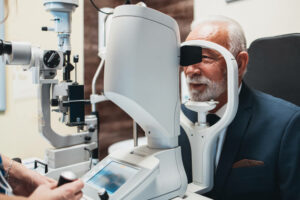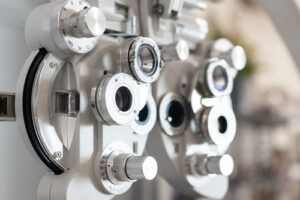Regular comprehensive eye exams are essential for maintaining good eye health and preventing vision loss. At St. Luke’s Eye, we believe in the importance of comprehensive eye exams and providing our patients with personalized care to ensure the best possible outcomes for their eye health.

During an eye exam, your technician and eye doctor will perform various tests in order to get an idea of your vision quality, eye health, and overall eye function. Eye exams are important because they can detect early signs of eye conditions.
When detected early, you are able to get timely treatment and management for eye conditions in order to prevent vision loss or other complications. Regular eye exams are also essential for maintaining good eye health and overall well-being.
Eye exams are not only important for detecting eye conditions but also for detecting damage to the eyes caused by other health issues. For example, high blood pressure and diabetes can cause damage to the blood vessels in the eyes, leading to vision loss or blindness.
Eye exams can also help detect refractive errors such as nearsightedness, farsightedness, and astigmatism, which can cause blurry vision and eye strain. If left untreated, refractive errors can lead to headaches, fatigue, and difficulty concentrating.
Eye exams are essential for maintaining good eye health and preventing vision loss. At St. Luke’s Eye, our experienced and highly trained eye doctors perform comprehensive eye exams using the latest technology and techniques to provide personalized care and ensure the best possible outcomes for your eye health.
It is generally recommended that adults get a comprehensive eye exam at least once every two years, or more frequently if they have certain risk factors or conditions.
Here are some factors that may increase your risk of eye problems and warrant more frequent eye exams:
It’s important to note that if you experience any sudden changes in your vision, eye pain, or other concerning symptoms, you should schedule an eye exam right away, regardless of when your last exam was.
During an eye exam, you can expect your technician and eye doctor to perform several tests to assess your vision and overall eye health. Here are some common tests that are typically performed during an eye exam:
This test involves reading letters or symbols on an eye chart to determine how well you can see at different distances.

A refraction test measures the way light enters your eye and helps determine if you need corrective lenses to improve your vision.
This may make patients think they we do things with things like strabismus, etc.
Your technician will also likely perform a peripheral vision test. This test is important for detecting any vision loss that may be related to glaucoma, retinal detachment, or other eye diseases.
Your technician and/or doctor will check your eye pressure. This test is an important component of most eye exams in order to screen for various eye diseases.
This exam involves dilating your pupils with special eye drops to examine the back of your eye, including the retina and optic nerve. Your eye doctor then uses a special microscope called a slit lamp to get a close look at the intricate structures at the back of your eye.
Dilation is a routine part of a comprehensive eye exam, as it allows your eye doctor to see the structures at the back of your eye more clearly. In order to dilate your eyes, your eye doctor will give you eye drops that cause your pupils to become larger, allowing more light to enter your eyes.
When your pupils are larger, it makes it easier for your eye doctor to examine the retina, optic nerve, and blood vessels in the eye and can help detect a variety of eye conditions. Dilation can cause temporary blurry vision at near and increased sensitivity to light.
These side effects usually wear off within a few hours. In most cases, dilation is an essential part of a routine eye exam.
However, in some cases, for some types of eye exams, dilation may not be necessary. Most eye doctors recommend dilation at least once a year for those with healthy eyes.
You may need to have your eyes dilated more frequently if you have certain eye conditions. If you have concerns or questions about dilation, it’s important to discuss them with your eye doctor beforehand.

The exact length of the exam can vary depending on several factors, such as the reason for the exam, your age, and the specific tests that need to be performed.
Your eye doctor will also take into account your medical history and your individual needs. If additional tests or procedures are needed, the exam may take longer.
It’s worth noting that the duration of an eye exam may also be affected by factors such as the patient’s age and ability to sit still during the exam, as well as the overall pace of the appointment. Some patients may require breaks during the exam, which can add to the total time needed for the appointment.
It’s important to allow enough time for an eye exam so that the eye doctor can conduct a thorough assessment and provide accurate recommendations for vision correction and eye health.
Is it time for you to have a comprehensive eye exam? Schedule an appointment at St. Luke’s Eye in Tampa, FL, today!
We proudly serve patients at our eye clinics in Tarpon Springs, Tampa, St. Petersburg, Clearwater, Spring Hill, Wesley Chapel and in The Villages at Lake Sumter Landing and Brownwood. Our philosophy is to treat those we serve as though they are a member of our own families. From the first phone call or email to the follow-up visit and beyond, we’re here to serve you. Our goal is to help preserve and optimize your vision.